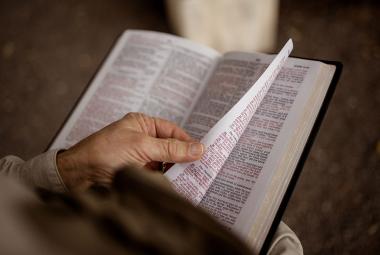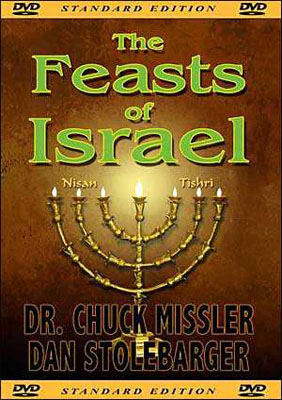The seven feasts of Moses are not only commemorative historically as they are observed in Judaism, but every detail of these feasts are anticipatory of the person, mission and achievement of the Messiah.
The anti-Semitism of the early Church is one of the great tragedies of history. While the teachings of Jesus came straight from the Hebrew Scriptures, a backlash against ritualistic devotion to the Law developed into a deliberate attempt to steer early Christians away from the Old Testament.
Tensions with the Jews led to severe persecution as the Church became a dominant political institution during subsequent centuries. A wedge was driven between Jews and Christians, although both worshipped the God of Abraham, Isaac, and Jacob. Jewish communities developed a staunch resistance to Jesus as the Messiah, and Christians lost the richness of Jewish history and prophecy, the very foundations of faith in Jesus Christ.
As Christians, we need to discover our Jewish roots. Many of the teachings of Christianity take on deeper insight and meaning when we understand them in a Jewish context, and few places is this more clear than in a study of the feasts of Israel. The seven feasts of Moses are not only commemorative historically as they are observed in Judaism, but every detail of these seven feasts are anticipatory of the person, mission and achievement of the Messiah.
Every Jot and Tittle
The great discovery in my life has been the realization that every detail in the Scriptures is there by supernatural engineering. Every number, every place name, even implied punctuation are there by design. The Bible contains 66 books by 40 authors, and yet the entire volume is a single, integrated message system.
The Appointed Times
The feasts of the Torah were directly dictated by God to Moses. The Hebrews called the feasts of Israel “the Appointed Times,” and the Jewish calendar offers many treasures to New Testament Christians even today.
The Law itself is our tutor. Jesus emphasizes the prophetic importance of the Law in John 5:46–47 when He tells the Jews, “For had ye believed Moses, ye would have believed me: for he wrote of me. But if ye believe not his writings, how shall ye believe my words?”
We might expect Jesus to fulfill the words of the prophetic books of the Bible, but Jesus makes it clear that He came to satisfy the words of the Law as well. The very Torah, the five books of Moses down to every last little dot, tells us about the Messiah.
In the Gospel of Matthew, Jesus assures His disciples:
“Think not that I am come to destroy the law, or the prophets: I am not come to destroy, but to fulfil. For verily I say unto you, Till heaven and earth pass, one jot or one tittle shall in no wise pass from the law, till all be fulfilled.”
— Matthew 5:17–18
In Hebrew, a jot looks like an apostrophe, hardly more than a little scratch. Tittles may have been the diacritical marks that suggest vowels, or they may have been decorative hooks on the letters. In other words, Jesus declares that every detail of the Hebrew Scriptures is important, down to the tiniest letters and marks.
If He were speaking in English, Jesus might have said, “Not one crossing of a ’t’ or dotting of an ‘i’ will pass from the Law till all be fulfilled.”
The Old Testament is not merely a collection of Jewish history and Law; it is God’s message of salvation to a fallen humanity. Paul picks up on this when he says in Romans 15:4: “For whatsoever things were written aforetime were written for our learning, that we through patience and comfort of the scriptures might have hope.” The ultimate commentary of the Bible is the Bible itself.
The Feasts of Israel
Let no man therefore judge you in meat, drink, or in respect of any holyday or of the new moon, or of Sabbath days. Which are a shadow of things to come; but the body is of Christ…
— Colossians 2:16–17
The Law clearly gives commandments regarding holy days, celebrations that Israel was commanded to remember and keep year after year. Yet Paul warns the Christian churches not to get caught up in the Law and judging one another over who celebrates when or eats what. Israel was commanded to keep the feast days because they reflected the mysteries that God wanted to reveal to His children in the years to come.
Each of the seven feasts of Moses has a historical root, but none are limited to it—Paul says they were given as a shadow of greater realities. Each feast has a prophetic role as well, a pattern for our greater understanding. It is provocative to note that not only are the feasts prophetic, but each gets fulfilled at its appointed time on the very day it is observed.
The first three feasts are in the spring; the Passover Feast, the Feast of Unleavened Bread, and the Feast of Firstfruits. They all occur in the first month of the religious year, Nisan. Shavuot, The Feast of Weeks, is celebrated 50 days after the Feast of Firstfruits. The final three appointed times are held in the fall, during the month of Tishri: the Feast of Trumpets, the Day of Atonement, and the Feast of Tabernacles.
This year, Israel’s Fall Feasts occur in September and October. [It is also important to remember that these feasts begin at sundown. The Scriptures do not reckon a day from midnight to midnight or from dawn to dawn, but from sunset to sunset.]
The Fall Feasts
Tishri is the first month of the New Year on the Jewish civil calendar. While Rosh Hashanah has been celebrated on this day since the return from Babylon, it is Yom Teruah that is the Scriptural feast. There are a variety of views regarding the prophetic implications of this feast, prophecies yet to be fulfilled.
The ten days between the Feast of Trumpets and the Day of Atonement (including the two feast days) are referred to as Yamim Noraim, the days of affliction or days of awe. The Day of Atonement, the most solemn day on the Jewish calendar, follows on the 10th of Tishri. Even the Jews who honor very little else will make it a point to honor Yom Kippur as a day of repentance, of getting right with God. Most take this day quite seriously.
Yom Kippur is the day of Israel’s national repentance. The Jews repent both as individuals and as a nation on this day. Prophetically, I believe Hosea 5:15 alludes to the present day when God says, “I return to my place until they acknowledge their offence; in their affliction, they will seek me earnestly.”
Five days after Yom Kippur (and incidentally five is the number for Grace), the temporary dwellings of Sukkot begin to fill yards and balconies and rooftops. The Feast of Tabernacles is a reminder of the years that the Israelites lived in makeshift booths during the years after their rescue from Egypt.
The Feasts and the Christian
Although we know that we have been freed from the Law and the “observances” of new moons, feasts etc., there is still value in understanding the roots of the Feasts. And if they can be used for edification and growth for the Christian, then why not take advantage of these so-called “rehearsals”?
Instead of approaching New Years in the way our culture puts it forth, why not take the time to reflect on the past year and during the Days of Awe ask the Holy Spirit to assist you in evaluating your walk. Give Him control and allow Him to free you from the things that can so easily entangle you.
[Ed Note: This article has been excerpted from our newest eBook release, The Feasts of Israel].







